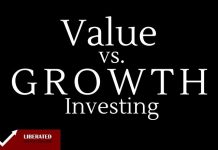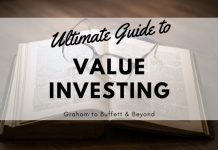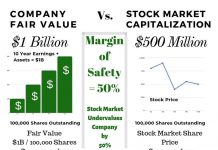Warren Buffett is far more than the most successful investor in a generation.
Buffett is also a businessman, philosopher, and writer who offers deep insights into many aspects of our world and life.
Because of his financial and philosophical wisdom, Buffett is known as “The Oracle of Omaha.”
My favorite Buffett quotes are “Rule No.1: Never lose money. Rule No.2: Never forget rule No.1.” and “The stock market is a device for transferring money from the impatient to the patient.”
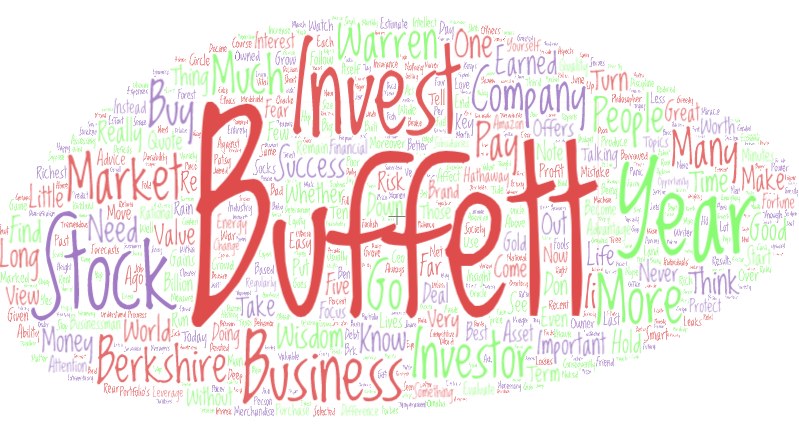
Who is Warren Buffett?
Buffett is the third richest man in the world. Paying attention to Buffett’s wisdom is smart for investors and speculators because Uncle Warren built that fortune with his investing prowess and simple philosophy.
Moreover, Buffett has been investing for 77 years. He started buying stocks in 1942, at the height of World War II, and keeps investing today as CEO of Berkshire Hathaway (NYSE: BRK.B). Consequently, Buffett could know more about stocks and the market than anyone else.
Warren Buffett’s Famous Quotes:
On Investing
“Rule No. 1: Never lose money. Rule No. 2: Never forget rule No.1.”
One of Buffett’s most famous quotes highlights that he is a very cautious investor who will only invest with a very high probability of profit. Warren is very risk-averse.
“If you understood a business perfectly and the future of the business, you would need very little in the way of a margin of safety. So, the more vulnerable the business is, assuming you still want to invest in it, the larger the margin of safety you’d need. If you’re driving a truck across a bridge that says it holds 10,000 pounds and you’ve got a 9,800-pound vehicle if the bridge is 6 inches above the crevice it covers, you may feel okay, but if it’s over the Grand Canyon, you may feel you want a little larger margin of safety…”
The margin of safety is all about reducing the risk of an investment. The bigger the discount you can get when buying a share of a company, the less risk you have because how far further could the stock price fall?
“The most important investment you can make is in yourself.”
A timeless truth that we have all heard. He does not mean that you should work your whole life; he means to invest in your education, but more importantly, the knowledge and research you need to make great decisions in investing and life.
“The rich invest in time, the poor invest in money.”
This quote refers to the fact that if you invest your time in earning money in your job, you will never get really rich, whereas the rich invest in freeing up their time with employees and people to do the work for them.
“Long ago, Ben Graham taught me that ‘Price is what you pay; value is what you get. Whether we’re talking about socks or stocks, I like buying quality merchandise when it is marked down.”
This is a fantastic quote that defines the huge difference between the price of a product and the value you derive from it. They are unrelated concepts. How you value something depends on your perception, whereas the market sets your price. He also highlights that his approach to buying a simple product like socks is the same as that of buying companies. You will make good investing decisions if you feel you are getting great value at a low cost.
“You only find out who is swimming naked when the tide goes out.”
This witty remark refers to Wall Street and investment advisors who make predictions and tell people how to invest their money. The point here is when the stock market falls, and hedge funds or managed funds go into insolvency, they swim naked, e.g., taking too many risks with other people’s money.
“You can turn any investment into a bad deal by paying too much. What you can’t do is turn something into a good deal by paying little.”
Again, he refers to his ethos of buying value, saying that even a good company can be a bad deal if the price is not right. You have to buy a good company at a great price.
Investing In Stocks Can Be Complicated, Stock Rover Makes It Easy.
Stock Rover is our #1 rated stock investing tool for:
★ Growth Investing - With industry Leading Research Reports ★
★ Value Investing - Find Value Stocks Using Warren Buffett's Strategies ★
★ Income Investing - Harvest Safe Regular Dividends from Stocks ★
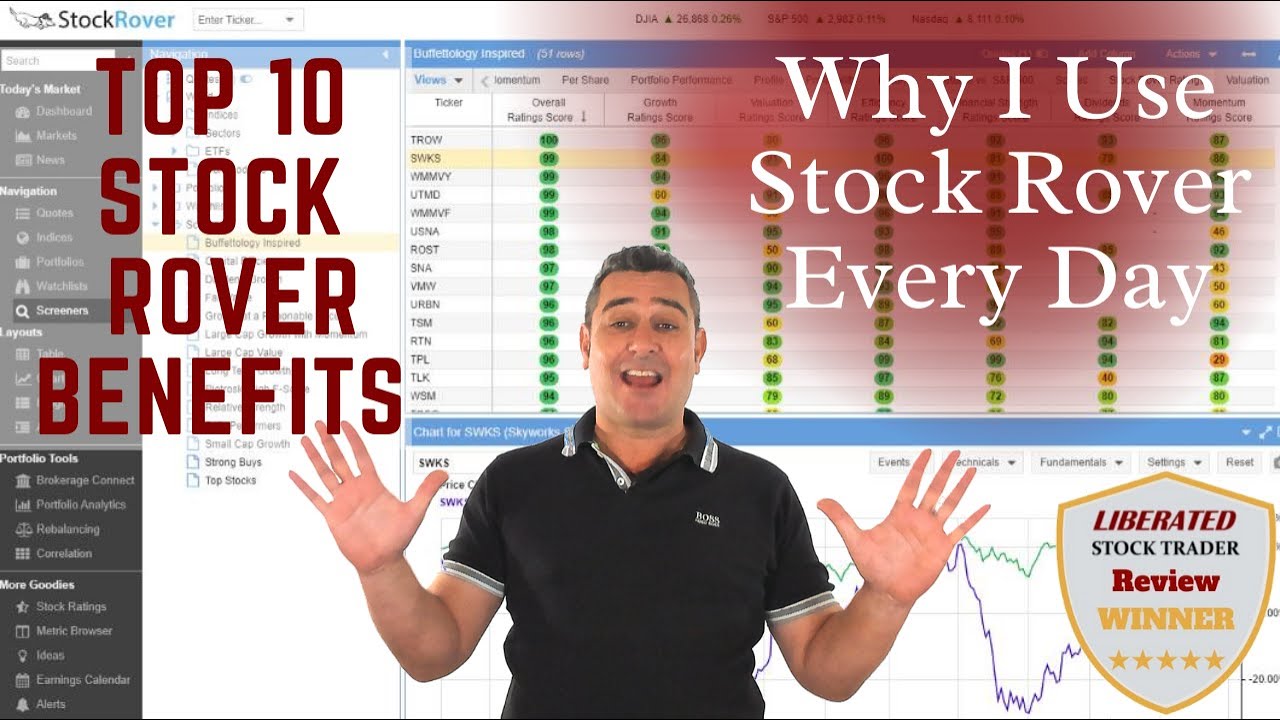
"I have been researching and investing in stocks for 20 years! I now manage all my stock investments using Stock Rover." Barry D. Moore - Founder: LiberatedStockTrader.com
“An investor needs to do very few things right as long as he or she avoids big mistakes.”
Risk is the metaphor here. Do not make risky decisions, use leverage, or trade; often, these are serious mistakes that can wipe out your good work.
“The key to investing is not assessing how much an industry will affect society, or how much it will grow, but rather determining the competitive advantage of any given company and, above all, the durability of that advantage.”
Core business school knowledge here. Any business’s goal is to gain and maintain a long-lasting competitive advantage; once you have this, the profits will roll in, and the share price will rise. It would be best to look out for companies that have cornered the market.
“Beware the investment activity that produces applause; yawns usually greet the great moves.”
One of Buffett’s strong beliefs is that boring businesses that churn out regular profits are much more important to a great investor than choosing fashionable new fast-growth businesses with higher risk. Choose the boring, regular profit-making companies.
“Successful Investing takes time, discipline, and patience. No matter how great the talent or effort, some things take time: You can’t produce a baby in one month by getting nine women pregnant.”
This is a witty quote that underlines how Buffett attributes his great wealth to time. Looking at any 10-year or 20-year period in the stock market’s history shows that stocks were always up. Extend this time over 50 years and allow your wealth and gains to compound over this period, and you will generate real wealth.
“If you aren’t willing to own a stock for ten years, don’t even think about owning it for ten minutes. Put together a portfolio of companies whose aggregate earnings march upward over the years, and so will the portfolio’s market value.”
“Buy a business; don’t rent stocks.”
These quotes reference the approach to long-term/buy-and-hold investing. You can and will make money in the stock market over any given 20-year period. Buying and selling stocks regularly (day trading) is a surefire way to fail.
“It is more important to say ‘no’ to an opportunity than to say ‘yes.”
“The ability to say ‘no’ is a tremendous advantage for an investor.”
“An investor should act like he had a lifetime decision card with just 20 punches on it.”
Again, saying no to investments is important; investing only when a truly great opportunity arises, not buying and selling daily. Referring to a card with 20 punches, he means in your life, think of only investing in 20 companies, not buying and selling hundreds of stocks in a year.
“The most important quality for an investor is temperament, not intellect. You need a temperament that neither derives great pleasure from being with or against the crowd.”
“If calculus or algebra were required to be a great investor, I’d have to return to delivering newspapers.”
“You don’t need to be a rocket scientist. Investing is not a game where the guy with the 160 IQ beats the guy with 130 IQ.”
Warren has never claimed to be a genius, and this refers to his belief that you do not need to be a rocket scientist, but you do need the right low-risk, insightful approach to evaluating companies and products.
“I’ve seen more people fail because of liquor and leverage — leverage being borrowed money. You don’t need leverage in this world much. If you’re smart, you’ll make much money without borrowing.”
Buffett warns about the perils of trading stocks instead of investing in great businesses. While it is fashionable to trade on leverage in Foreign Exchange, it will often lead to failure.
“Stop trying to predict the stock market’s direction, the economy, interest rates, or elections.”
Buffett does not try to make market predictions; he researches, acquires, and runs good companies. The profits will then take care of themselves.
“Growth and value investing are joined at the hip.”
There is a perception that there are two key investing areas. The first is investing for growth, which means investing in fast-growing companies, usually startups. The second is investing in value stocks, which are companies whose intrinsic value is below their current market value.
“An investor should ordinarily hold a small piece of an outstanding business with the same tenacity that an owner would exhibit if he owned all of that business.”
The point here is that as a business owner, you fight hard to keep your business running and, ideally, growing. If you have a few bad months, you will not sell the business and try to buy another business. Buffett believes in long-term investing and compares investing in stocks to owning a business. Do not sell when you see a dark cloud on the horizon.
“Why not invest your assets in the companies you like? As Mae West said, ‘Too much of a good thing can be wonderful.'”
This is good guidance on the mental side of investing; only buy company shares if you are passionate about the results the business will bring. Also, if a business is great, load up on stocks.
“Be fearful when others are greedy and greedy when others are fearful.”
This is a clear nod to contrarian investing. They are taking advantage of the stock market’s schizophrenia. After a market has crashed or experienced a significant downturn, Buffett argues that this is often the best time to buy stocks because they are sold at seriously discounted prices. When everyone is fearful, the market is usually at a 52-week low, or worse, stock prices have declined, and the margin of safety is significantly higher.
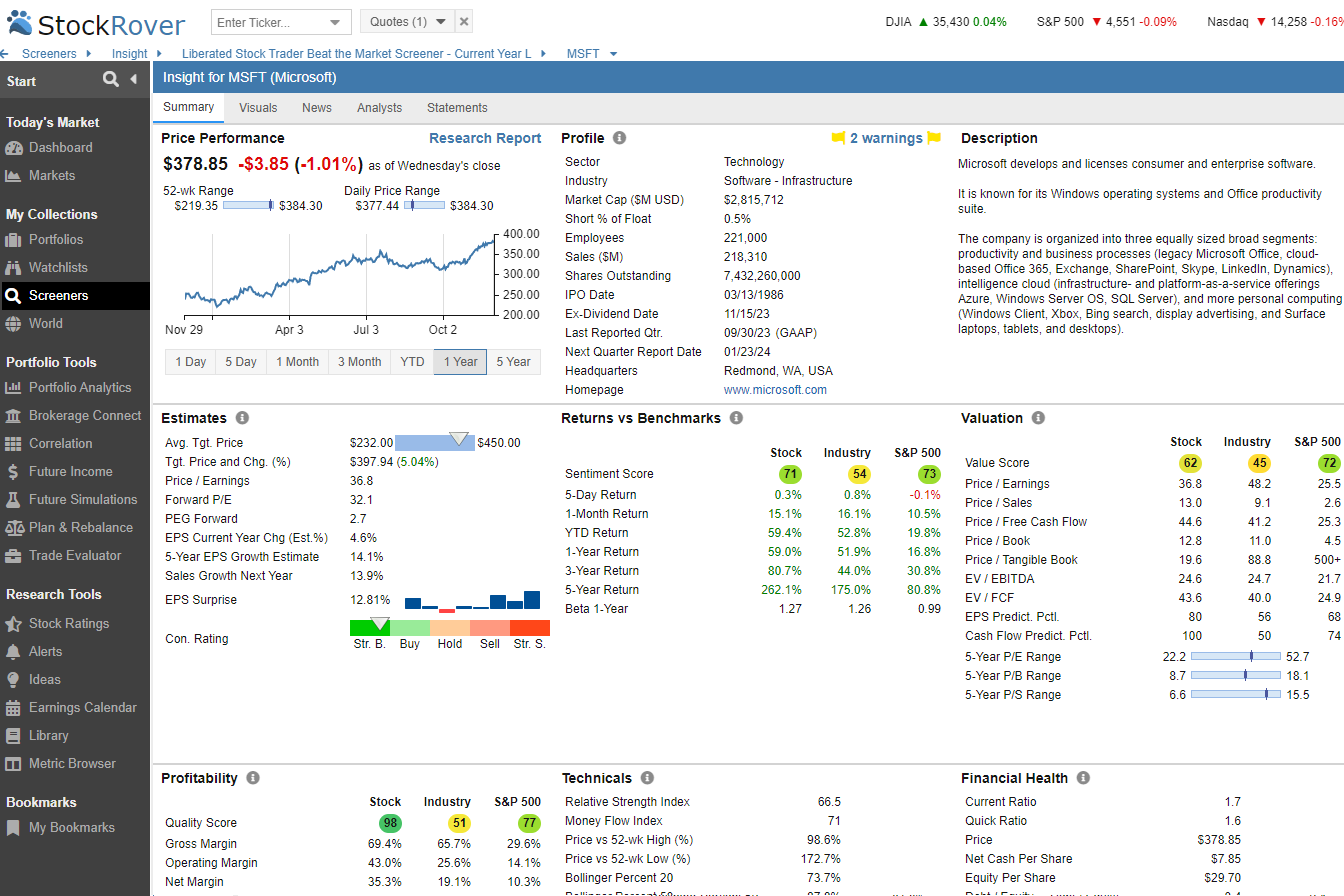
Try Powerful Financial Analysis & Research with Stock Rover
“Widespread fear is your friend as an investor because it serves up bargain purchases.”
This is a jibe at how wrong most investors are. For example, when everyone around you talks about investing in Cryptocurrencies, it is probably time to sell. Moreover, when everyone is complaining about the huge crash in the Crypto market, it could be time to buy.
“It is optimism that is the enemy of the rational buyer.”
Wall Street has an inherent positive bias on the stocks it is trying to market. Buffett suggests that this overly positive bias is detrimental to investing success. Always learn the side of being risk-averse and judge every investment with a critical eye.
“Buy a stock the way you would buy a house. Understand and like it such that you’d be content to own it without any market.”
This is stunning advice from Buffett. As a shareholder in a company, if you are paid good dividends leading to a regular income and are satisfied, this is a sign of a good company. Would you still be happy with that income if there was no stock market or buyers for your shares?
“Today, people who hold cash equivalents feel comfortable. They shouldn’t. They have opted for a terrible long-term asset that pays virtually nothing and is certain to depreciate.”
Most registered financial advisors and Robo Advisors suggest that in modern portfolio management, you should invest in cash and stocks depending on your risk profile. Warren rightly suggests that this thinking is false; cash investments are dead money that do not work.
“Investing is like baseball. If you want to score runs, don’t study the scoreboard; study the playing field.”
This quote is about how you select companies to invest in. Studying the playing field means understanding a company’s industry and competitive environment. Does it have a competitive advantage? Studying the scoreboard refers to staring at stock charts or considering only a single company, not the industry.
[Related Article: 4 Steps To Building Your Own Warren Buffett Stock Screener]
On Risk
“Diversification protects against ignorance. It makes little sense to those who know what they’re doing.”
“Risk can be greatly reduced by concentrating on only a few holdings.”
“Risk comes from not knowing what you are doing.”
Wall Street and investment advisors commonly recommend the mantra of being broadly diversified. However, Buffett suggests that this is only recommended because the advisors cannot discern what truly excellent long-term investments are. As you can see, this fact is the bare truth that nearly all diversified investments rarely beat the average stock market returns.
“You will see way more overvalued stocks than undervalued. It’s common for promoters to value a stock at 5-10 times its true value, but it’s rare to find a stock trading at 20% of its true value.”
Another truth of investing is that Wall Street overvalues most stocks. The market participants generally do not find the really valuable underpriced companies, and most investors do not have the patience to hold these value stocks for the long term.
“Those who regularly preach doom because of government budget deficits (as I regularly did myself for many years) might note that our country’s national debt has increased roughly 400-fold during the last of my 77-year periods. That’s 40,000%!”
Again, it highlights the benefits of buying and holding stock in great companies. Despite 18 stock market crashes in the last 100 years, long-term investors have made great profits.
” Suppose you had foreseen this increase and panicked at the prospect of runaway deficits and a worthless currency. To ‘protect’ yourself, you might have eschewed stocks and opted instead to buy [3.25] ounces of gold with your $114.75.” “And what would that supposed protection have delivered? You would now have an asset worth about $4,200, less than 1% of what would have been realized from a simple unmanaged investment in American business. The magical metal was no match for the American mettle.”
Finally, in this section, Buffett highlights the futility of closing stock market investments to hedge against the risk of a crash. Gold is a great example here because gold or currency hedging has not proven to be a haven against stock declines.
On Stock Selection
“Never invest in a business you can’t understand.”
” We blew it” by not buying Alphabet (NASDAQ: GOOG) or Google years ago.
“I’ve watched Amazon from the start. What Jeff Bezos has done is something close to a miracle. The problem is that when I think something will be a miracle, I tend not to bet on it.”
Buffett only invests in simple businesses with a competitive advantage in industries not subject to massive change. Even though he freely admits to missing the boat on some high-tech companies, as you can see from the Amazon and Google quotes, he has no regrets.
“The Internet, as a phenomenon, is just huge. That much, I understand. I just don’t know how to make money at it… I don’t try to profit from the Internet. But I want to understand the damage it can do to an established business. Our approach is profiting from a lack of change rather than from change. With Wrigley chewing gum, the lack of change appeals to me. I don’t think it is going to be hurt by the Internet. That’s the kind of business I like.”
Here, Buffett explains that he cannot foresee the speed of development and the unseen risks of industry disruption, representing a risk he is unwilling to invest in.
“If a business does well, the stock eventually follows.”
Wall Street analysts will eventually discover businesses making regular profits and controlling their costs in an industry in which they have an advantage, and the stock will rise accordingly.
“Only buy something you’d be perfectly happy to hold if the market shuts down for ten years.”
Again, he refers to buying shares in a business regardless of what the market thinks and how the market values the stock.
“What an investor needs is the ability to correctly evaluate selected businesses. Note that word “selected”: You don’t have to be an expert on every company or even many. You only have to be able to evaluate companies within your circle of competence. The size of that circle is not very important; knowing its boundaries, however, is vital.”
Do not spread your focus too widely; evaluate what you know in an industry that you know, and you will be able to uncover the gems that will make you money.
“Do not take yearly results too seriously. Instead, focus on four or five-year averages.”
“Our favorite holding period is forever.”
Focusing on the long-term is what Warren preaches; this is another example of helping people relax about their investments and focus on the long-term future.
My thorough testing awarded TradingView a stellar 4.8 stars!
With powerful stock chart analysis, pattern recognition, screening, backtesting, and a 20+ million user community, it’s a game-changer for traders.
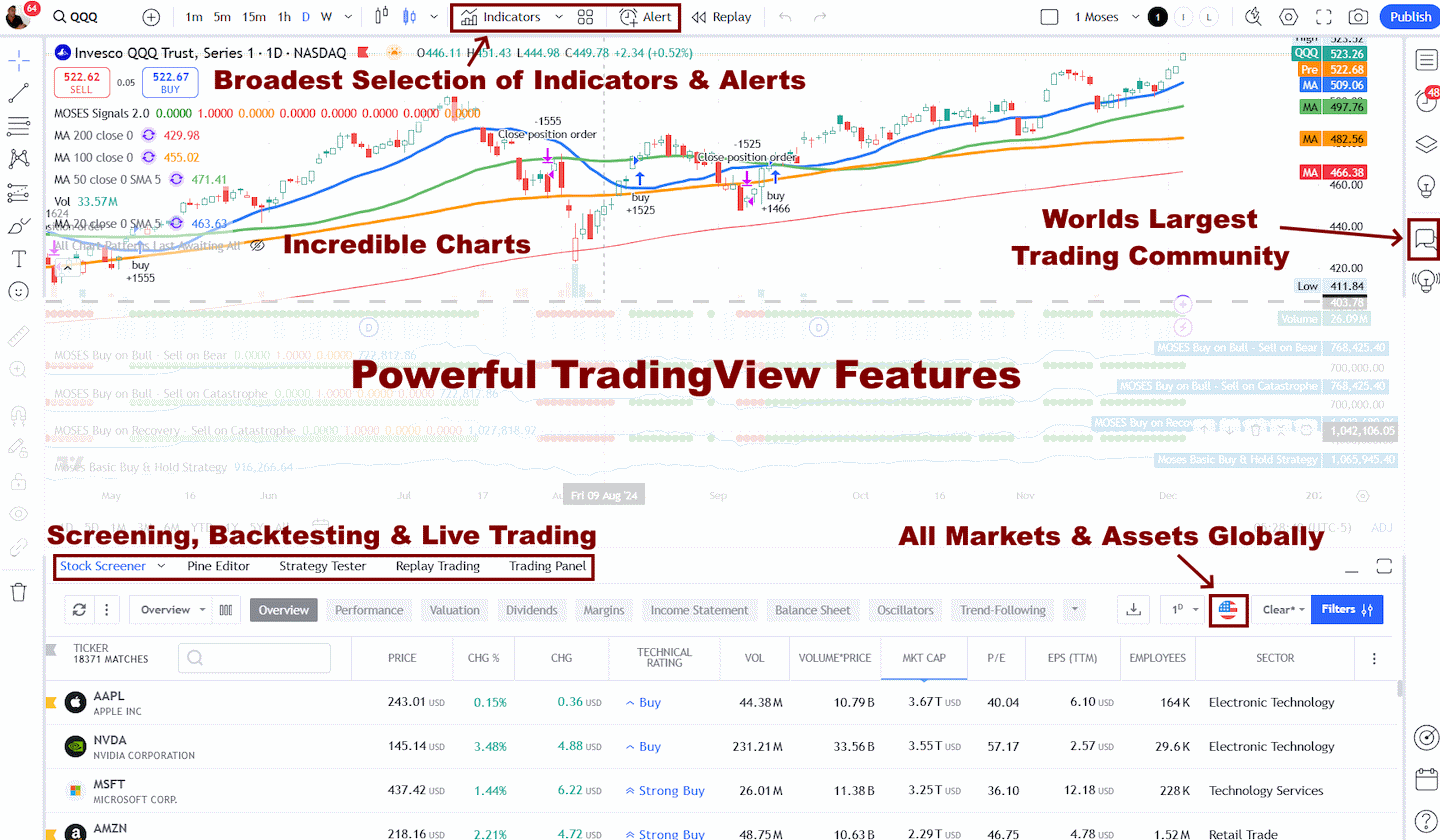
Whether you're trading in the US or internationally, TradingView is my top pick for its unmatched features and ease of use.
Explore TradingView – Your Gateway to Smarter Trading!
“Focus on return on equity, not earnings per share.”
This refers to focusing on the value of a company, not the speed of its earnings increases.
“What the wise do in the beginning, fools do in the end.”
The wise people here are people like Buffett, who find great companies at low market valuations and buy them. The fools are the majority of investors who jump on the investing bandwagon too late when the share price is so high it is difficult to make a good profit. Towards the end of a stock market crash, everyone sells their holdings (the fools), whereas the wise buy.
“Nobody buys a farm based on whether they think it will rain next year. They buy it because they think it’s a good investment over 10 or 20 years.”
“Lethargy bordering on sloth should remain the cornerstone of an investment style.”
Buffett warns against frequent trading, referring to day traders and swing traders. Lethargy and sloth also mean not being an active investor trading the markets daily; let the businesses you buy work for you long-term.
“Opportunities come infrequently. When it rains gold, put out the bucket, not the thimble.”
If you find a great investment opportunity, grab it with both hands and enjoy the windfall; do not be overly cautious.
“Turnarounds seldom turn.”
“Buy companies with strong histories of profitability and a dominant business franchise.”
The mantra here is the common theme of competitive advantage and the ability to scale. Buffett follows a set of specific investing rules to find companies with great histories of growth and stability.
“Time is the friend of the wonderful company, the enemy of the mediocre.”
Mediocre companies will eventually lose out to fitter and stronger companies. The wonderful company with a competitive advantage and long-term profitability will win over time.
“In the short term, the market is a popularity contest. In the long term, the market is a weighing machine.”
The media and Wall Street constantly promote fashionable stocks; Buffett rebels against this popularity contest. The weighing machine refers to the fact that good companies’ market dominance and profitability will mean, eventually, they will be valued highly.
“You should not invest in the stock market unless you can watch your stock holding decline by 50 percent without becoming panic-stricken.”
This refers to having patience and belief in investment throughout the inevitable dips and crashes in the stock market. Mr. Market is paranoid and emotional, and its valuations on companies are rarely correct in the short term.
“For the investor, a too-high purchase price for the stock of an excellent company can undo the effects of a subsequent decade of favorable business developments.”
Again, the concept of the price you pay to hold stock. It may cost you long-term if you pay a high price for those earnings (price/earnings ratio).
On Business
“In the business world, the rear-view mirror is always clearer than the windshield.”
This commentary on business decision-making essentially means that it is easy to see your errors when you reflect on your historical decisions. Understanding all the ramifications of the decisions you are making now is much more difficult. Do not get hung up on past decisions or people’s views of them.
“I am a better investor because I am a businessman, and I am a better businessman because I am an investor.”
Buffett is proud of being an investor and running and growing a huge business. Having business understanding and experience in running businesses is of great help to long-term investors. What stocks does Warren Buffett’s portfolio own?
“Amazon itself has become a brand. Kirkland is now a brand doing $39 billion. Kirkland does more business than Coke does. Certain retail systems have gained some power, particularly in the case of Amazon, Walmart, and Costco, which have gained power relative to brands.”
This article provides insight into the fact that logistics businesses can also become the main product or service, and strong branding plus global reach can help the business accelerate into industry leadership.
“The business schools reward difficult, complex behavior more than simple behavior, but simple behavior is more effective.”
Buffett never went to business school; he has a simple yet powerful approach to business based on numbers and good ethical business decision-making. Business schools, he believes, obstruct the simplicity of building and running a business.
“I try to invest in businesses that are so wonderful that an idiot can run them. Because sooner or later, one will.”
This is an excellent insight into the fact that many businesses begin to fail when the third generation of family owners takes over. A business that is so simple that any idiot can run it is a maxim that reminds us of the risks of nepotism.
“Pricing your products is an ongoing process that requires a good mix of math and market research. All business owners need to learn how to do it right”.
Finally, in this section, Buffett believes that the correct pricing of any product can be the deciding factor in a business’s success.
On Berkshire Hathaway
This is a selection of self-explanatory quotes from letters to Berkshire Hathway shareholders.
“We do not view the company itself as the ultimate owner of our business assets but instead view the company as a conduit through which our shareholders own assets.”
Berkshire Hathaway is a Fortune 500 company, but its leaders, including Buffett, see it more as an active fund acquiring assets for its shareholders.
“Fortunately, it’s not necessary to evaluate each tree individually to estimate Berkshire’s intrinsic business value. That’s because our forest contains five “groves” of major importance, each of which can be appraised, with reasonable accuracy, in its entirety.”
Buffett intimates that Berkshire has so many individual companies under ownership that it makes more sense to evaluate each subsidiary rather than focusing on each entity separately.
“In recent years, the sensible course for us to follow has been clear: Many stocks have offered far more for our money than we could obtain by purchasing businesses in their entirety.”
This refers to the fact that if Berkshire Hathaway were interested in buying an entire company, this would instantly boost the stock price to a point where the margin of safety is destroyed. So, acquiring stock slowly over time has been the right strategy.
“When we say “earned,” moreover, we are describing what remains after all income taxes, interest payments, managerial compensation (whether cash or stock-based), restructuring expenses, depreciation, amortization, and home-office overhead.”
Buffett discusses real earnings or after-tax profits instead of those often referenced in the stock market, such as accounting jargon like pre-tax earnings EBITDA (before interest, tax, depreciation, and amortization), etc.
“Despite our recent additions to marketable equities, the most valuable grove in Berkshire’s forest remains the many dozens of non-insurance businesses that Berkshire controls (usually with 100% ownership and never with less than 80%). Those subsidiaries earned $16.8 billion last year.” – Clarification: this quote comes from Buffett’s 23 February 2019 Letter to Berkshire Hathaway Stockholders.
“Daily, we do what we find interesting, working with people we like and trust. And now our new management structure has made our lives even more enjoyable.” – Buffett on his job at Berkshire Hathaway.
“It is a terrible mistake for investors with long-term horizons — among them pension funds, college endowments, and savings-minded individuals — to measure their investment’ risk’ by their portfolio’s ratio of bonds to stocks.”
“Focus on operating earnings, paying little attention to gains or losses of any variety. My saying does not diminish the importance of our investments to Berkshire.”
This is essentially a comment on modern portfolio management theory, which suggests that risk is limited by splitting your portfolio across stocks and bonds. The focus should be on high-quality stocks with a high margin of safety. You limit risks by purchasing stocks of great companies at great prices, not by adding bonds to your portfolio.
“Berkshire may be the only company in the Fortune 500 that does not prepare monthly earnings reports or balance sheets. I, of course, regularly view the monthly financial reports of most subsidiaries. But Charlie and I
learn of Berkshire’s overall earnings and financial position only every quarter.”
Why should you if Buffett does not focus on the minutiae of every company’s quarterly earnings?
“Furthermore, Berkshire has no company-wide budget (though many of our subsidiaries find one useful). Our lack of such an instrument means that the parent company has never had a quarterly “number” to hit. Shunning the use of this bogey sends an important message to our many managers, reinforcing the culture we prize.”
Try TradingView, Our Recommended Tool for International Traders
Global Community, Charts, Screening, Analysis & Broker Integration

Global Financial Analysis for Free on TradingView
On Success & Life
“The difference between successful people and successful people is that successful people say no to almost everything.”
Buffett gets pitched on investing opportunities almost daily, but he usually says no if they do not meet his investment criteria. He attributes this to his immense success.
“It is unnecessary to do extraordinary things to get extraordinary results.”
A self-deprecating Buffett always maintains that who he is and what he does is not particularly special, just common sense.
“Only when you combine sound intellect with emotional discipline do you get rational behavior.”
“If you cannot control your emotions, you cannot control your money.”
Referring to the emotional and logical balance required in good decision-making, Buffett makes a serious statement about approaching all decisions, not just investing.
“Without passion, you don’t have energy. Without energy, you have nothing.”
Set goals that make you passionate. If you are passionate about what you do, you will be motivated. That motivation will give you the energy to keep going. Buffett is in his mid-80s and will never retire due to his energy and passion.
“Should you find yourself in a chronically leaking boat, energy devoted to changing vessels is likely more productive than energy devoted to patching leaks.”
Buffett shares a pearl of wisdom regarding seeing problems for what they are. Here, the problem is larger than most people would understand; you need to be able to see the big picture and be prepared to make drastic changes.
“If you are in a poker game and after 20 minutes, you don’t know who the patsy is, you’re the patsy.”
I love this quote and use it all the time, but it says that you should look at the motivations of others; if you do not understand who will lose on a deal, it is probably you.
“Can you explain to a fish what walking on land is like? One day on land is worth a thousand years of talking about it, and one day running a business has the same value.”
This means that talk is cheap; you must do it to gain insight and experience.
“If history were all that was needed to win the game of money, the richest people would be librarians.”
Referring to the stock chart analysis, Buffett explains that a stock’s past history is no indicator of future performance. The key to investing is understanding and discovering a valuable business at a great price.
“Someone’s sitting in the shade today because someone planted a tree long ago.”
This refers to the fact we are all sitting on the shoulders of giants, and we all benefit from the hard work and foresight of our ancestors who went before us.
“Tell me your heroes, and I’ll tell you how you turn out.”
“It’s better to hang out with people better than you. Pick out associates whose behavior is better than yours, and you’ll drift in that direction.”
These quotes share the insight that Buffett attributes his financial success to his mentor, the great Ben Graham, the author of the original work on value investing, “The Intelligent Investor.” If you choose the right mentor or hero, you will follow them.
“If you are stuck in a hole, stop digging.”
When all you are doing is contributing to your problems, you need to stop.
“If you don’t find a way to make money while you sleep, you will work until you die.”
This means getting your money to work for you rather than working for your money. You must make investments that will pay you back regularly, such as dividend investing, for regular income.
Chains of habit are too light to be felt until they are too heavy to be broken.
This quote is incredibly philosophical, referring to everything from addiction to drugs and alcohol to the things we do every day.
There seems to be some perverse human characteristic that likes to make easy things difficult.
Never a truer word was spoken; things can get very complicated quickly, from investing to trading and in our technology. Producers add features and benefits to separate themselves from the competition, but this often simply adds complications to simple things.
“Those who know the edge of their competency are safe, and those who don’t aren’t.”
This means you should try to understand what you are good at and what you are not. We, humans, overestimate our real abilities most of the time. Do this while investing, and you will likely lose money through incompetence.
“I want to give my kids just enough, so they feel they can do anything, but not so much that they feel like doing nothing.”
Many articles have been written on Buffett’s inheritance plans for his family. Still, the fortune will not ultimately go to them, as he will be giving the majority to charitable causes like the Bill and Melinda Gates Foundation.
“You can’t make a good deal with a bad person.”
“It is impossible to unsign a contract, so do all your thinking before you sign.”
This is clearly about doing your due diligence, whether investing in the market, buying a house, or even getting married. Do the research and make the right decision.
On Love and Integrity
“I measure success by how many people love me.”
“Money, to some extent, sometimes lets you be in more interesting environments. But it can’t change how many people love you or how healthy you are.”
“When you get to my age, you’ll measure your success by how many people you want to have love you do love you.”
“In the world of business, the most successful people are those who do what they love.”
“If you get to my age in life and nobody thinks well of you, I don’t care how big your bank account is; your life is a disaster. That’s the ultimate test of how you have lived your life.”
These are fine words from a good man; even though he is one of the richest men globally, he still fundamentally understands that you have failed without love.
On Money & Advice
“Never ask a barber if you need a haircut.”
Warren points out that stockbrokers will tell you to continually buy and sell stocks and funds because they make money when you do. However, all that is to you is the cost.
“The advice ‘you never go broke taking a profit’ is foolish.”
This is true; if you only make small profits, you may be unable to cover your living expenses or investing time. You want to hold out for larger, more gradual profits over time.
“Honesty is a very expensive gift. Don’t expect it from cheap people.”
A social commentary suggests that most people are not honest with you, so when someone is honest, appreciate it and do not expect honesty from people you do not trust.
“Forecasts may tell you a great deal about the forecaster; they tell you nothing about the future.”
The next time you see someone talking extremely positively about a stock or the market direction, ask yourself why they are trying to sell you the idea.
“Calling someone who trades actively in the market an investor is like calling someone who repeatedly engages in one-night stands a romantic.”
Here, the message is that people who trade stocks are not investors; they are traders, and traders are promiscuous. An investor should be in love with the investment.
“No one cares more about your money than you do.”
Wall Street has a similar phrase, “Other people’s money.” Both of these quotes refer to the fact that if you give your money to someone to invest, they will not take care of it as you would; they may take unnecessary risks with it.
“The stock market is designed to transfer money from the active to the patient.”
This is so true. Traders pay a lot of money to transact shares in companies; the more active you are is not related to your profits, only your costs.
“Wall Street is the only place people ride to in a Rolls Royce to get advice from those who take the subway.”
This is one of my favorites. He refers to the fact that rich people take advice from the less wealthy on how to make money.
On Leadership and Ethics
“If you’ve got a good enough business, if you have a monopoly newspaper, if you have a network television station — I’m talking of the past — you know, your idiot nephew could run it. And if you’ve got a really good business, it doesn’t make any difference.”
The point is that anyone can run a great business as long as the business fundamentals remain the same.
“And if it’s okay for the boss to cheat a little, it’s easy for subordinates to rationalize similar behavior.”
“What starts as an “innocent” fudge to not disappoint “the Street” – say, trade-loading at quarter-end, turning a blind eye to rising insurance losses, or drawing down a “cookie-jar” reserve – can become the first step toward full-fledged fraud.”
These two quotes provide an important insight into how corruption starts; small slights of hand or unethical activities can grow over time into large-scale scandals and corruption.
“It takes 20 years to build a reputation and five minutes to ruin it. If you think about that, you’ll do things differently.”
Finally, Buffett’s simple yet powerful warning about how unethical activities can ruin your career, life, relationships, and investments.
Summary
As you can see, Warren Buffett’s wisdom covers many topics. Reading Buffett will always give you valuable insight into life, ethics, philosophy, the economy, human nature, and the market.
If you have any Warren Buffett quotes that you love, leave a comment below and let us know.

